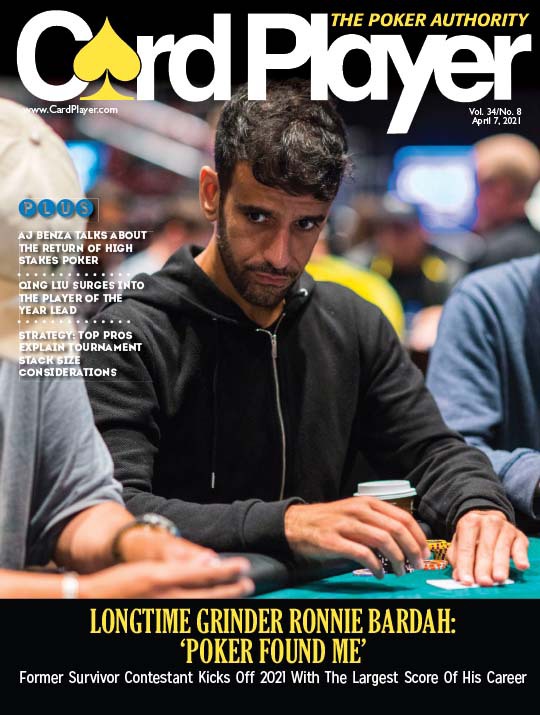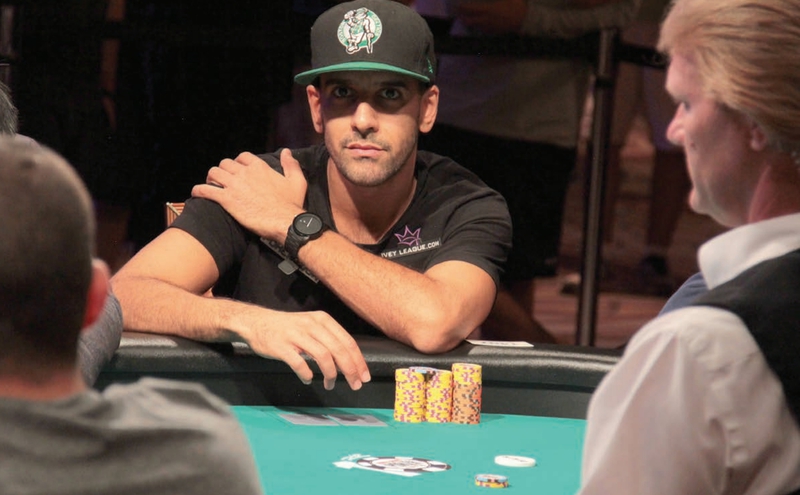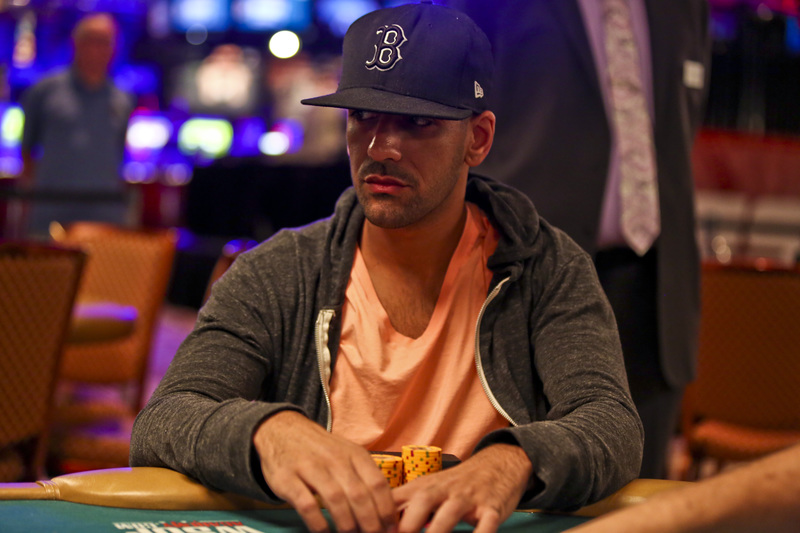






Longtime Grinder Ronnie Bardah: ‘Poker Found Me’Former Survivor Contestant Kicks Off 2021 With The Largest Score Of His Careerby Julio Rodriguez | Published: Apr 07, 2021 |
|
|
 Ronnie Bardah has a way of finding the spotlight. The Brockton, Massachusetts native has become one of poker’s most recognizable faces thanks to his accomplishments at the World Series of Poker, as well as a part he played in a viral online video, and even his short-lived time on the 2019 season of Survivor.
Ronnie Bardah has a way of finding the spotlight. The Brockton, Massachusetts native has become one of poker’s most recognizable faces thanks to his accomplishments at the World Series of Poker, as well as a part he played in a viral online video, and even his short-lived time on the 2019 season of Survivor.
Even though he only lasted one episode on the CBS game show, it was viewed by 6.3 million in the US alone before being picked up on streaming platforms. Those numbers don’t compare to how many have seen his appearance on the 2014 poker show Shark Cage, where he was infamously bluffed by model Sara Chafak, who represented Finland in the 2012 Miss Universe pageant.
“Is this real life?” Bardah incredulously asked, in a clip that has more than nine million views on YouTube and counting.
“That’s just nine million views on that one. There’s a lot of different clips around,” Bardah is quick to point out. “I think collectively it’s been seen close to 40 million [times.]”
While it’s undoubtedly awkward to be known for a blunder at the table or for being the first person voted out on one of the highest rated reality shows ever, Bardah has made plenty of noise with his accomplishments on the felt as well.
In addition to winning a WSOP bracelet in 2012, Bardah also currently holds the record for the most consecutive main event cashes in poker history. Most recently, he chopped up the World Poker Tour Lucky Hearts Poker Open main event to take home $566,135, the largest score of his career.
Bardah recently appeared on Card Player’s Poker Stories podcast to talk about the ups and downs of his career. Highlights of the interview appear below. You can listen to the full episode on Apple Podcasts, Stitcher, Spotify, or any podcast app.
Growing Up In A Casino
Once you find out how Bardah spent a good portion of his youth, you can see how he ended up as a professional card shark.
“Not to sound corny, but poker found me,” said Bardah. “I grew up in a casino. Both of my parents were pretty much degenerates, my dad especially. God bless him, but he just loved to gamble. He was always in the casinos playing Caribbean Stud, Roulette, Blackjack, Craps, and he played poker as well. He taught me how to play poker at a young age. We would play a lot of five card draw or stud. I knew what beat what at like eight years old. When I was 13, my parents got divorced, which was really hard on my dad.”

His father’s gambling addiction worsened, and Bardah and his sister found themselves spending many of their days and nights at the dog track, or casinos such as Foxwoods and Mohegan Sun in nearby Connecticut.
“I was in the arcade with all of the same kids every single weekend. ‘See you next week,’ we would say to each other, because we knew our parents [would be back.] The arcade would close at like 10 or 11 o’clock, and then we’d have to sit on a bench for a few hours waiting for him. A couple of times he would say that we were going home, but instead he would go gamble a little more. We’d wake up at four in the morning in the car with the windows cracked. It is what it is. I love him to death, and I’m not ashamed of him. That’s just what life was [for us back then.]”
He started playing as soon as he could, even getting a fake ID when he was in high school so he could gamble at the casino. Although he had an up- close view of what not to do from his father, Bardah had to learn many of the hard lessons for himself. After turning pro, he would run up several bankrolls, only to blow it with pit games like blackjack.
“Most times I would get my face ripped off, and whatever I had in my pocket was gone,” admitted Bardah. “Poker was so good, and I was making so much money that it didn’t really matter. But then I got a little older and just cut it off. Now I’m like Knish, you know what I mean? I don’t do that anymore.”
The Streak
Bardah currently holds the record for the most consecutive WSOP main event cashes, with five. His deepest run was in 2010, when he finished 24th for $317,161.
“My first main event was in 2006,” Bardah recalled. “I won my seat in a single table satellite, and ended up busting at the end of day 1. I shoved 9 7
7 for ten big blinds and a guy called me with A-8 off. And I berated the guy. ‘How do you call?’ I was so obnoxious, yelling at this guy for calling me with the best hand.”
for ten big blinds and a guy called me with A-8 off. And I berated the guy. ‘How do you call?’ I was so obnoxious, yelling at this guy for calling me with the best hand.”
The experience was sour, and Bardah didn’t play the main event again until he won another seat in 2010.
“I won my seat in Israel while I was on the beach, teaching my cousin how to play sit-n-gos.”
Full Tilt was offering their satellite winners the option of playing in the main event seat or pocketing the buy-in, and a bad run in cash games leading up to the series had Bardah wondering if he should take the gamble.
.jpg)
“I went there with my last $8,000 and told myself, ‘If [you] don’t run up this money playing $30-$60 limit hold’em… forget the main event. You got to take care of yourself.’ To make a long story short, I ran up the money to $18,000 in a week. I played in the main, and I took 24th place. That’s what really changed my life. That’s what really gave me confidence and set me forward. Now I could play games comfortably, and it was a different ball game.”
Bardah went on to cash in five consecutive main events, which remains the record. “And I had chips in every one of those years, but in 2014, my fifth cash, I was grinding on the bubble and it was so nerve wracking.”
How To Approach The Main Event
When asked what his approach to the main event was, Bardah preached the importance of patience.
“You just got to realize that you have two-hour levels,” he said. “I tell myself in my head when I’m playing the main event, that this is a marathon. It’s the biggest and longest marathon in poker. Everybody knows you can’t win a tournament in one day, but you can definitely bust in one hand.”
“I turn down a lot of spots that a lot of other players might take, spots that I would call semi-high variance. I just like playing a lot post-flop in position. If people build these humongous pots preflop, I tend to stay away. I pride myself on avoiding a lot of unavoidable situations. Sometimes you’ll hear someone say, ‘Oh, nothing you can do there. I had this many chips, and this is what it says I have to shove with, and we can’t fold here.’ I just like to factor in risk/reward. ‘Is it worth it for me to take this spot?’ I mean, you’re always so deep in the main.”
Another factor to doing well is taking advantage of the numerous dead money spots at each table.
“Table draw is very important, and I was fortunate to have some amazing table draws through the years. Sometimes you get some rough spots, a few good players, but you just stay away from them unless you got to butt heads. You look around the table and there’s a lot of satellite winners, bar tournament winners from Wichita who will openly tell you that it’s their first main event. Oh man, don’t say that! Or they tell you that they know who you are. You got to play out how people perceive you.”
But the biggest advice Bardah has for first timers in the main event is to not be intimidated by the pros.
“A lot of players think I’m a lot better than I actually am. I tell beginners that it’s just poker. Cards speak, use your gut, good luck. Like, enough. Stop thinking Darren Elias and Fedor Holz [are some gods]. Yes, these guys are really good at poker, but you need to get that out of your head and just play.”
Winning His Bracelet
Of course, there are plenty of other tournaments to play the rest of the summer. In 2012, he won his first WSOP bracelet, banking $182,088 in the $2,500 six-handed limit hold’em event.
“Winning a bracelet in my favorite game was… if you watch the interview, I was beside myself. Limit hold’em is one of my passions. I love six-max and short-handed limit hold’em. It’s like war. You’re always in action, turning so many hands into bluffs, value betting with ace high, calling down with king high and queen high in some spots, check-raising turns. Every moment matters, saving a bet matters, your gut matters. It’s just so much fun.”
 Bardah is clearly passionate about limit hold’em, and nearly won a second bracelet when he took third in the $5,000 limit hold’em event. But his opinion on the game puts him in the minority among today’s players.
Bardah is clearly passionate about limit hold’em, and nearly won a second bracelet when he took third in the $5,000 limit hold’em event. But his opinion on the game puts him in the minority among today’s players.
“You’ve got all these players who want to bracelet hunt so they jump in these limit hold’em tournaments and then complain, saying, ‘limit hold’em sucks!’ Shut up. You guys don’t play enough to understand how fun it is. Limit hold’em cash is so much more fun than no-limit cash, and it’s not even close.”
A Huge Score To Kick Off 2021
Live poker was on pause for much of 2020 due to the global pandemic, but after a hiatus of nearly a year, the World Poker Tour returned in late January for the Lucky Hearts Poker Open. New regulations required short-handed tables, plexiglass dividers, and players to wear a mask, however that didn’t stop a huge crowd of people eager to sign up for one of the first major live poker tournaments in months. The conservative $1 million guarantee was more than quintupled with 1,573 entries in the $3,500 buy-in tournament.
After four days of play, Bardah found himself at the final table. During three-handed play he worked out a deal with Robel Andemichael and eventual winner Ilyas Muradi that saw him take home $566,135, the largest score of his career.
“I ended up taking third after the deal, but it was great,” Bardah said. “You know, it was a chop, but it was basically a win, with life-changing money. It just kind of hit me, having this money. [Over the years,] I took care of my family, my dad, a lot of different things. But now I get to take care of me.”
Bardah’s Five-Year Cash Streak In The WSOP Main Event
Whether Bardah’s record is in jeopardy is a matter of debate, given that there were three different versions of the main event in 2020, all of them played at least initially online. Additionally, the WSOP has in recent years paid out 15% of the field, rather than the traditional 10%, making it easier for players to finish in the money.
There are just 37 players in poker history who have more main event cashes than Bardah, including notables such as Johnny Moss (6), Dan Harrington (6), Scotty Nguyen (6), Phil Ivey (6), Antonio Esfandiari (6), Mike Sexton (7), Phil Hellmuth (8), Bobby Baldwin (9), Chris Bjorin (9), Humberto Brenes (9), and Doyle Brunson (9). Berry Johnston, Allen Cunningham, and Johnny Chan are currently tied for the most cashes all time with 10.
| Year | Finish | Payout |
| 2010 | 24th Place | $317,161 |
| 2011 | 453rd Place | $27,103 |
| 2012 | 540th Place | $21,707 |
| 2013 | 124th Place | $50,752 |
| 2014 | 475th Place | $25,756 |
Features
The Inside Straight
Strategies & Analysis